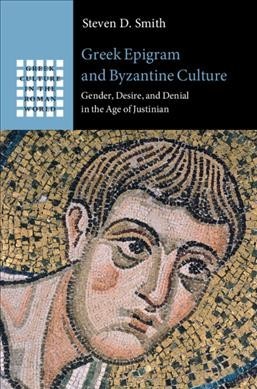| Greek Epigram and Byzantine Culture: Gender, Desire, and Denial in the Age of Justinian Contributor(s): Smith, Steven D. (Author) |
|
 |
ISBN: 1108480233 ISBN-13: 9781108480239 Publisher: Cambridge University Press OUR PRICE: $114.00 Product Type: Hardcover - Other Formats Published: May 2019 |
| Additional Information |
| BISAC Categories: - History | Ancient - General - History | Europe - Greece (see Also Ancient - Greece) |
| Dewey: 949.501 |
| LCCN: 2019003482 |
| Series: Greek Culture in the Roman World |
| Physical Information: 0.8" H x 6.2" W x 9.1" (1.20 lbs) 288 pages |
| Themes: - Chronological Period - Ancient (To 499 A.D.) - Cultural Region - Greece |
| Descriptions, Reviews, Etc. |
| Publisher Description: Sexy, scintillating, and sometimes scandalous, Greek epigrams from the age of the Emperor Justinian commemorate the survival of the sensual in a world transformed by Christianity. Around 567 CE, the poet and historian Agathias of Myrina published his Cycle, an anthology of epigrams by contemporary poets who wrote about what mattered to elite men in sixth-century Constantinople: harlots and dancing girls, chariot races in the hippodrome, and the luxuries of the Roman bath. But amid this banquet of worldly delights, ascetic Christianity - pervasive in early Byzantine thought - made sensual pleasure both more complicated and more compelling. In this book, Steven D. Smith explores how this miniature classical genre gave expression to lurid fantasies of domination and submission, constraint and release, and the relationship between masculine and feminine. The volume will appeal to literary scholars and historians interested in Greek poetry, Late Antiquity, Byzantine studies, Early Christianity, gender, and sexuality. |
Contributor Bio(s): Smith, Steven D.: - Steven D. Smith is Professor of Classics and Comparative Literature at Hofstra University, New York. His publications include Greek Identity and the Athenian Past in Chariton: The Romance of Empire (2007) and Man and Animal in Severan Rome: The Literary Imagination of Claudius Aelianus (Cambridge, 2014). |